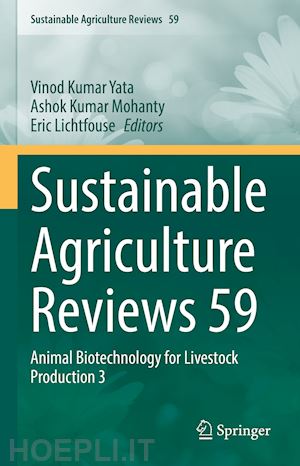
Questo prodotto usufruisce delle SPEDIZIONI GRATIS
selezionando l'opzione Corriere Veloce in fase di ordine.
Pagabile anche con Carta della cultura giovani e del merito, 18App Bonus Cultura e Carta del Docente
The dependency on animal biotechnology in livestock industries has been increased in the recent past. The livestock production research has witnessed remarkable developments on biotechnological methods to produce the elite animal breeds. The global animal food requirement has been steadily increasing, and animal production needs to be increased as per the global needs. This book covers various aspects of animal biotechnology such as, reproductive biotechnologies in sheep and goats, oogenesis and folliculogenesis and ovarian disorders. This book focusses the discussion on proteomics and metabolomics, and separate chapters were dedicated to discuss these topics. The proteomics studies of animal viruses were discussed in this book, and this would be helpful to understand animal viral pathogenesis. The applications of metabolomics in livestock were discussed with focus on data analysis, identification of unknown compounds. The purpose of this book is to provide the recent research trends, and convert all this information to usable guide to professionals, researchers and students who are working the research area of animal biotechnology.
Chapter 1. Reproductive biotechnologies applied to the female sheep and goat.- Chapter 2. Oogenesis and folliculogenesis.- Chapter 3 Proteomics of animal viruses.- Chapter 4. Influence of the ovarian reserve and oocyte quality on livestock fertility.- Chapter 5. Metabolomics of food systems.- Chapter 6. Phytobioactive compounds on ovarian functions in mammals.- Chapter 7. Buffalo embryo production
Dr. Vinod Kumar Yata is an interdisciplinary researcher working at National Dairy Research Institute, Karnal, India. Previously, he worked as an Assistant professor at the Department of Biotechnology, Dr. B R Ambedkar National Institute of Technology Jalandhar, Punjab, India. He received his Ph.D. in Biotechnology from Indian Institute of Technology Guwahati. He specializes in interdisciplinary research which includes Nanotechnology, Microfluidics, Animal Biotechnology, Cancer biology and Bioinformatics. He has developed a microfluidic device for the separation of live and motile spermatozoa from cattle semen samples. His research interests have been focused on the development of nanocarriers, understanding prodrug enzyme therapy, and targeted drug delivery. He elucidated the structural features and binding interactions of several biomolecules by in silico methods. He has published four books as an editor and one book as an author with Springer Nature publisher. He has published several research papers in peer reviewed international journals and presented papers in several international conferences.
Dr. Ashok Kumar Mohanty is an eminent scientist in Animal Biotechnology and is currently serving as Joint Director, ICAR-Indian Veterinary Research Institute, Mukteswar, Uttarakhand, India. His group is involved in various basic and applied research related to animal production systems and the research group has made pioneering contributions in the field of Animal Biotechnology, with emphasis on Gene cloning, Expression and Functional characterization of Animal Proteins, Proteomics in Animal Production, Cell and Molecular Biology and Structural Biology of Proteins. He has organized national and international workshops and conferences and is a recipient of several awards which includes, DBT Overseas Associateship by Ministry of Science & Technology, Govt. of India., Jawaharlal Nehru Award (gold medal) by Indian Council of Agricultural Research (ICAR), New Delhi for outstanding postgraduate research in the field of Animal Biotechnology. He is the Fellow of National Academy of Dairy Sciences (NADS), India and executive member of proteomics society of India and associate fellow of National Academy of Veterinary Science, India. He has supervised more than 50 graduate, PhD students and postdocs and published more than 200 peer reviewed research and review papers. He has authored 8 book chapters in the areas of animal and food biotechnology published by national and international publishers.
Dr. Eric Lichtfouse is a biogeochemist at Aix Marseille University who has invented carbon-13 dating, a molecular-level method allowing to study the dynamics of organic compounds in temporal pools of complex environmental media. He is Chief Editor of the journal Environmental Chemistry Letters, and the book series Sustainable Agriculture Reviews and Environmental Chemistry for a Sustainable World. He is the author of the book Scientific Writing for Impact Factor Journals, which includes an innovative writing tool: the Micro-Article.











Il sito utilizza cookie ed altri strumenti di tracciamento che raccolgono informazioni dal dispositivo dell’utente. Oltre ai cookie tecnici ed analitici aggregati, strettamente necessari per il funzionamento di questo sito web, previo consenso dell’utente possono essere installati cookie di profilazione e marketing e cookie dei social media. Cliccando su “Accetto tutti i cookie” saranno attivate tutte le categorie di cookie. Per accettare solo deterninate categorie di cookie, cliccare invece su “Impostazioni cookie”. Chiudendo il banner o continuando a navigare saranno installati solo cookie tecnici. Per maggiori dettagli, consultare la Cookie Policy.